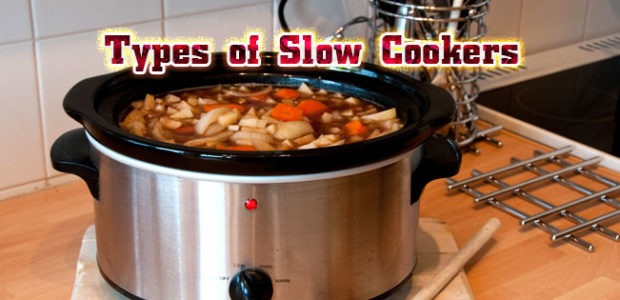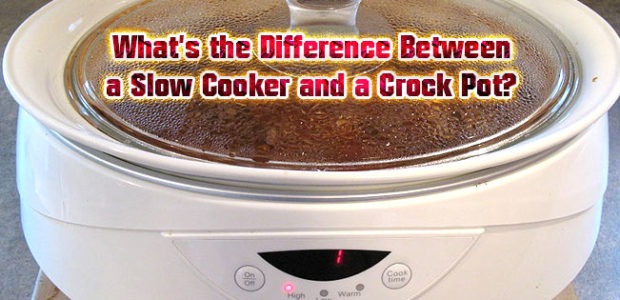What Is the Most Non-Toxic Type of Cookware?
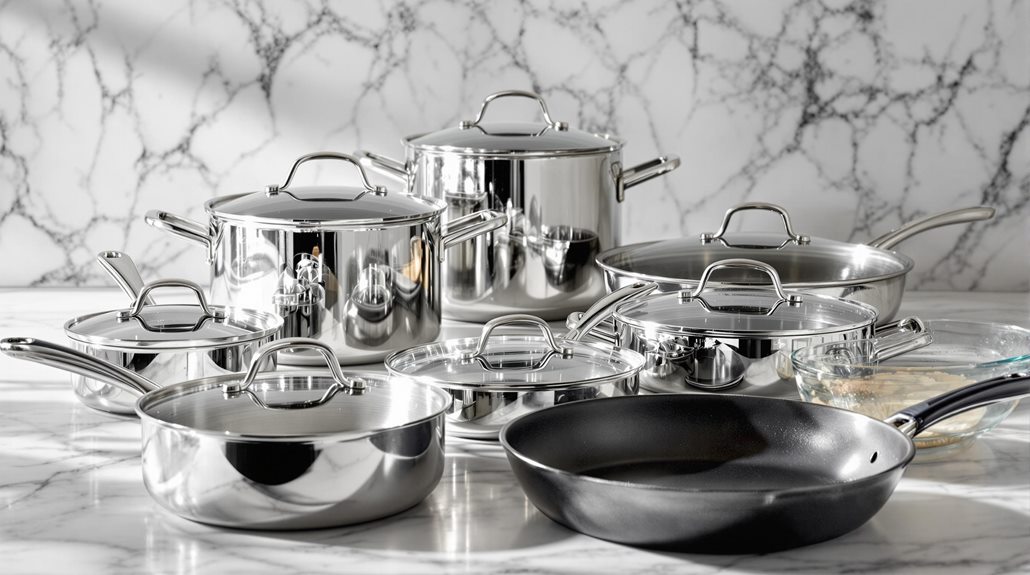
When choosing non-toxic cookware, you'll find stainless steel, cast iron, and carbon steel are your safest options. High-quality stainless steel (grades 304, 316, or 430) won't leach harmful substances, while properly seasoned cast iron creates a natural non-stick surface without dangerous chemicals. You'll want to avoid cookware with PFAS "forever chemicals" or damaged ceramic coatings that can release toxins. Also, steer clear of aluminum pots and copper pans that might leach metals into your food. For ideal safety and performance, look for products with third-party certifications and reliable manufacturing standards. There's much more to investigate about each cookware option's specific benefits and care requirements.
Understanding Non-Toxic Cookware Materials
The quest for safer cooking begins with understanding the materials that make up non-toxic cookware. When you're selecting pots and pans, you'll find that stainless steel, cast iron, and carbon steel stand out as the most reliable options. These materials don't require additional coatings and offer excellent heat distribution while maintaining their non-toxic properties throughout years of use.
While ceramic cookware is often marketed as a safe alternative, you'll need to be vigilant about its care and maintenance to guarantee its safety over time. It's important to be wary of cookware with non-stick coatings containing PFAS, as these "forever chemicals" can persist in both your body and the environment. You'll also want to avoid melamine dishes, which can leach harmful substances into your food, particularly when exposed to high temperatures or acidic ingredients.
Don't take manufacturers' claims at face value. Instead, look for third-party certifications that verify the non-toxic status of your cookware. These independent assessments provide reliable confirmation that your cooking vessels meet safety standards and won't compromise your health during food preparation.
Health Risks of Traditional Cookware
Understanding non-toxic alternatives becomes even more persuasive when you consider the serious health implications of traditional cookware. The most concerning issues stem from commonly used materials that can release harmful substances into your food during cooking.
Consider these major health risks associated with traditional cookware:
- Nonstick cookware containing PFOA and PFAS chemicals poses significant dangers, as these substances are linked to cancer, birth defects, and heart disease. They're already present in 99% of people's bloodstreams.
- Aluminum pots and pans can release heavy metals into your food, potentially causing neurotoxic effects and cognitive problems over time.
- Copper cookware, while excellent for heat distribution, may leach metals into acidic foods, creating health concerns for sensitive individuals.
- Even ceramic cookware, often marketed as non-toxic, can become problematic if its protective coating gets damaged by metal utensils.
While stainless steel remains a relatively safe option, and cast iron offers durability with controlled iron exposure, you'll need to weigh these choices carefully. When exposed to high heat, many traditional cookware materials can release toxic fumes or particles that compromise your family's health.
Stainless Steel Safety and Benefits
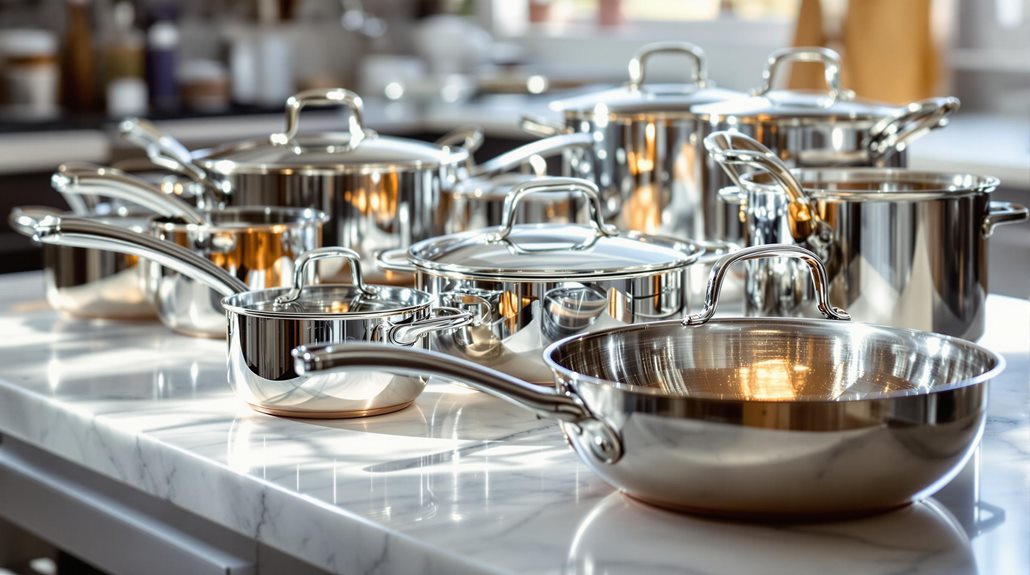
Safety-conscious cooks often turn to stainless steel as their go-to cookware choice, and for good reason. When you're looking for non-toxic options, high-quality stainless steel grades like 304, 316, 430, or surgical steel stand out as top performers. These grades won't leach harmful substances into your food and effectively resist corrosion during cooking.
You'll get the best results from stainless steel cookware that features multi-ply construction with an aluminum core. This design guarantees superior heat distribution, preventing hot spots and providing even cooking results. While the initial investment might be higher, you're paying for durability and peace of mind.
To maintain your stainless steel cookware's non-toxic properties, you'll need to care for it properly. Avoid using harsh abrasives that can damage the surface and compromise its safety features. When shopping for stainless steel cookware, check the manufacturing location to ensure it meets strict safety regulations and quality standards. By choosing reputable manufacturers and properly caring for your cookware, you'll enjoy years of safe, reliable cooking performance from your stainless steel pots and pans.
Cast Iron Cooking Advantages
While many modern cookware options crowd the market, seasoned cast iron remains a timeless choice for health-conscious home cooks. The naturally durable construction and seasoned surface create a natural nonstick cooking experience without harmful chemicals. You'll find that cast iron's superior heat retention makes it perfect for searing meats and baking everything from cornbread to deep-dish pizzas.
When you cook with cast iron regularly, you'll enjoy these significant benefits:
- The seasoned surface develops a reliable nonstick coating that improves with each use, guaranteeing the elimination of the need for synthetic nonstick materials
- Cast iron's excellent heat retention and even heating properties make it ideal for achieving perfect sears and consistent baking results
- Your food's iron content increases naturally when cooked in cast iron, providing an essential dietary mineral
- With proper care and rust prevention techniques, your cast iron cookware can last for generations, making it a cost-effective investment
To maintain your cast iron's performance, you'll need to follow basic care guidelines: clean it properly, maintain its seasoning, and store it in a dry place. This simple maintenance routine confirms your cookware remains a reliable kitchen workhorse for years to come.
Ceramic Options Worth Considering
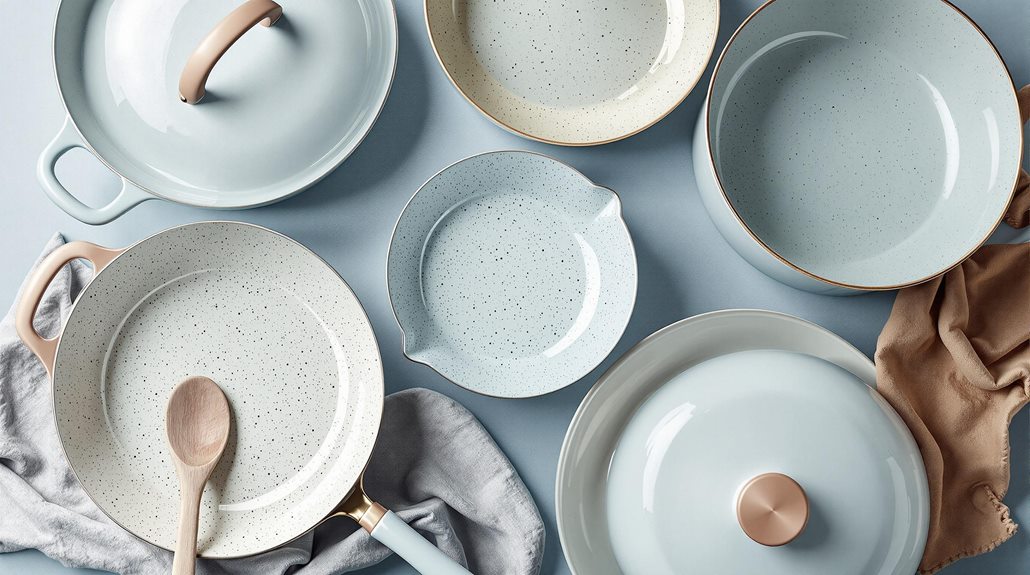
Modern ceramic cookware offers an engrossing alternative to traditional nonstick pans, featuring silica-based coatings free from PFOA and PTFE chemicals. If you're seeking non-toxic cooking solutions, ceramic options provide peace of mind regarding chemical off-gassing and migration concerns that often arise with conventional nonstick surfaces.
Two standout brands deserve your attention: Caraway and GreenPan. Caraway's Nonstick Ceramic Cookware Set combines PFOA-free and PTFE-free coatings with exceptional durability and easy-to-clean surfaces. GreenPan offers versatile ceramic sets that are oven-safe up to 600°F and work on all stovetop types, making them practical for diverse cooking needs.
While ceramic cookware's non-toxic properties make it appealing, you'll need to maintain it properly to safeguard longevity. Avoid metal utensils that can damage the silica-based coating, and handle your cookware with care to prevent chipping or cracking. When properly maintained, ceramic cookware provides a reliable, health-conscious alternative to traditional nonstick options, though you should weigh the potential durability trade-offs against your cooking habits and maintenance preferences.
Proper Care for Safe Cookware
Maintaining your non-toxic cookware requires a clear understanding of proper care techniques for each material type. To safeguard the longevity and safety of your cookware, you'll need to follow specific maintenance guidelines for different materials. Let's focus on essential care practices that'll help preserve your cookware's non-toxic properties.
- For cast iron cookware, proper seasoning is imperative. You'll need to maintain the natural nonstick coating through regular seasoning, which creates a protective layer that prevents food from sticking and rust from forming.
- When using ceramic coated cookware, avoid metal utensils that can scratch or damage the nonstick ceramic coating. Always monitor cooking temperature to prevent the coating from breaking down, which could compromise its non-toxic properties.
- With stainless steel cookware, clean regularly using nonabrasive materials to prevent pitting and scratches that might lead to unwanted leaching. A gentle sponge or soft cloth works best for maintaining its surface.
- Proper cookware storage is indispensable for all types. Don't stack pieces without protective layers between them, and avoid placing heavy items on top that could damage non-stick surfaces or protective coatings.
Top Brands and Performance Tests
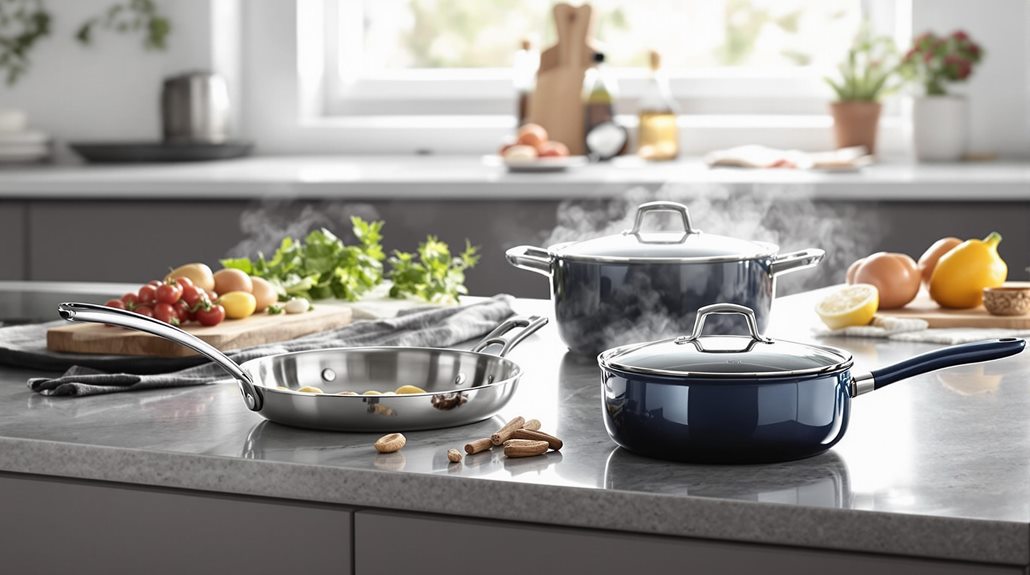
Now that you understand proper cookware care, let's examine the top-performing brands based on rigorous testing. Serious Eats' detailed evaluation of stainless steel options reveals that the Made In 12-Inch Skillet outperforms its competitors, while the All-Clad D3 10-Piece Set stands out for its superior heat retention and three-layer construction.
For those seeking non-toxic alternatives to traditional nonstick coatings containing PFOA and PFAS, both Caraway and GreenPan offer excellent ceramic coated options. Caraway's cookware set features a PTFE-free ceramic coating that's both durable and safe, while GreenPan's collection is oven-safe up to 600°F and compatible with all stovetops, including induction.
The Le Creuset Stainless Steel 10-Piece Set demonstrates exceptional versatility, combining the benefits of traditional stainless steel with modern safety features. While copper cookware sets and carbon steel cookware also offer non-toxic cooking solutions, stainless steel and ceramic coated options currently lead the market in terms of performance and quality.


